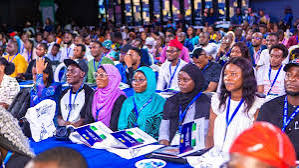The Muslim Congress (TMC) has taken a bold step toward addressing negativity and strengthening leadership capacity across its ranks with the successful hosting of its 2025 National Leadership Workshop. The two-day hybrid event, themed “The Big Picture Leadership,” held at the Federal Government Housing Estate in Batoro, Sagamu, Ogun State, brought together leaders from TMC branches, state chapters, and the national body to engage with pressing issues affecting organizational growth and Islamic activism.
Speaking during one of the key sessions, Dr. Zafaran Adeniyi, the Chief Executive Officer of Vanguards Academy and a respected author, drew attention to what he described as the “negativism syndrome” that undermines progress within Islamic organisations. Dr. Adeniyi noted that no institution can thrive in the presence of individuals who harbour pessimistic mindsets, stressing that such attitudes are often rooted in spiritual weakness.
“Negativism is a reflection of weak iman (faith), and individuals who display this trait must be identified early and guided appropriately,” he said. According to him, negative thinking manifests when people believe that proposed goals or tasks are unattainable, thereby hindering collective advancement. He warned that organisations driven by Islamic ideals must not tolerate such defeatist tendencies, as they are capable of stalling projects, weakening activism, and rendering meetings ineffective.
Citing examples of how negativism can take subtle forms, Dr. Adeniyi explained that even when members agree on a course of action during meetings but later act contrary or abandon follow-through, it amounts to the same destructive attitude. “This attitude is not just counterproductive; it breeds internal sabotage,” he emphasized, calling for renewed spiritual consciousness as the foundation of sound leadership. “When iman is strong, decision-making becomes more purposeful, leadership becomes dynamic, and accountability thrives,” he added.
He advocated for robust planning, thorough task review mechanisms, and the identification of those whose attitudes may discourage others within the system. Dr. Adeniyi concluded by recommending feedback sessions to evaluate how well participants internalize key lessons from the workshop.
The first day of the workshop also featured a thought-provoking session by Ustadh AbdulAzeez Adelopo, CEO of Ictify Solutions, Ibadan, who addressed the evolving relationship between artificial intelligence and Islamic mission work. In his presentation titled “AI for Islamic Mission: Friend or Foe?” Ustadh Adelopo maintained that AI, much like any tool, is neutral and its benefit or harm depends on how it is applied.
He likened AI to a knife, useful in capable hands and dangerous in careless ones. “Artificial Intelligence is a tool. If used with purpose, ethics, and understanding, it can transform the da’wah landscape positively,” he said. He highlighted AI tools such as ChatGPT, Google Translate, facial recognition systems, and recommendation algorithms, suggesting their usefulness in areas like Qur’anic translation, Juma’h khutbah content generation, and community outreach.
In a related presentation, Engr. Tajudeen Oladoja, a chartered project manager and CEO of PM Ideals, emphasized the importance of addressing potential problems early in organisational operations. Speaking on the topic “Managing the Impact of Environmental Factors Towards Successful Endeavours,” he explained that identifying issues before they evolve into serious problems could significantly increase an organisation’s success rate.
According to him, issue management is not merely a reactionary process but a strategic necessity that boosts stakeholder confidence. “A well-defined issue management system helps in tracking concerns, assigning appropriate responses, and avoiding crisis-level situations,” he stated. He also explained the subtle distinction between issues and problems, noting that framing a situation as an “issue” can sometimes help reduce tension and foster proactive resolution.
Welcoming participants to the workshop, TMC’s Amir (President), Alhaji Abdulwasi Bangbala, underscored the rationale behind the annual event, describing it as a platform for refining leadership acumen and understanding the complex demands of contemporary society. “Leadership is not a static role. It changes with time, and as an Ummah, we must adapt our strategies to meet new realities,” he said.
Quoting the Prophet Muhammad (SAW), Alhaji Bangbala said, “The strong believer is better and more beloved to Allah than the weak believer, though there is good in both.” He noted that strength in leadership encompasses intellectual, emotional, and spiritual dimensions, not just physical ability. He thanked the facilitators for sharing their expertise and encouraged participants to fully engage and learn from the sessions.
He further reminded participants that leadership in Islam is a sacred trust (Amānah), urging them to apply the lessons learnt in service to Allah and humanity. “We must leave this gathering not just as better leaders, but as more devoted servants of Allah—leading with wisdom, justice, and integrity,” he charged.
Also speaking at the event, the Chairman of the Planning Committee, Malam Lawal Salman, who also serves as the Executive Director of the Global Center for Leadership and Human Development, stressed the importance of cultivating open-mindedness in leadership. He argued that current socio-economic and cultural challenges in Nigeria demand that Muslim leaders embrace broader perspectives and environmental awareness to remain relevant and effective.
“To make a meaningful impact, our leaders must think beyond the narrow lens of tradition. That is why this year’s theme—‘The Big Picture Leadership’—is timely and significant,” he said.
With this year’s workshop concluded, TMC has once again reaffirmed its commitment to building a new generation of visionary leaders equipped with the spiritual grounding, technical knowledge, and adaptive strategies required to lead effectively in today’s complex world.
